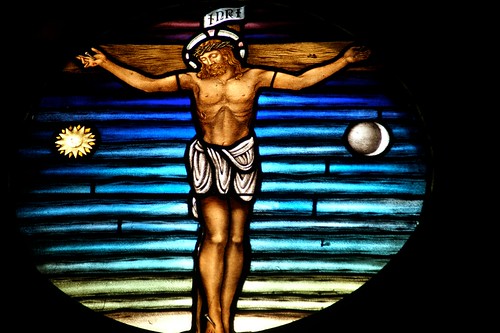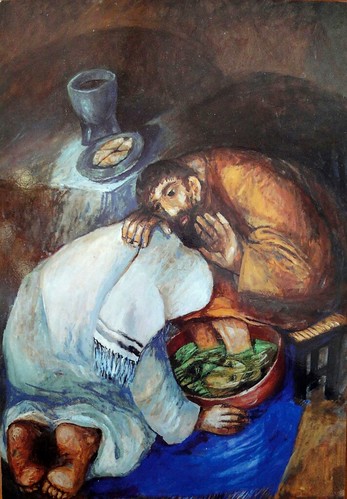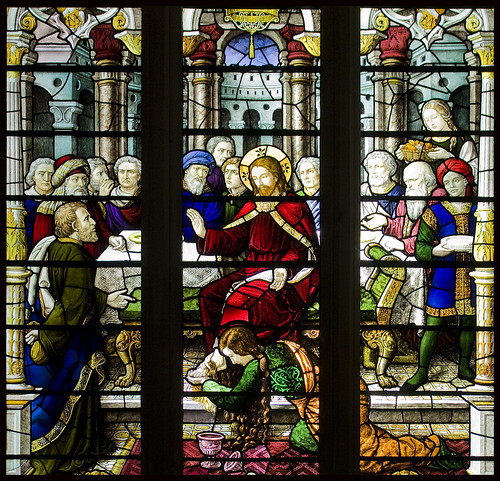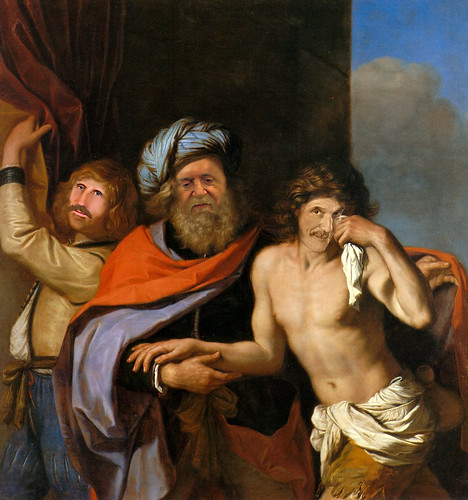Easter Day, 27 March 2016
St. Luke's Church, Burlington (Diocese of Niagara)
John 20: 1-18
 |
| Photo Credit: Waiting for the Word on Flickr.com |
Hallelujah! Christ is risen. The Lord is
risen indeed, Hallelujah!
This is the traditional acclamation and
response for Easter which has been proclaimed for a couple of millennia since the
first Easter.
For me it is extremely important to note
that it is proclaimed in the present tense. Christ is risen, rather than
Christ rose, like 2000 years in the past. Christ is a present reality. Christ
is risen, not only for Mary Magdalene, but also for you. So what does that look
like?
Well, we can go back to that first Easter
story and see what it looked like then.
The themes of darkness and light are very
important in John’s Gospel. From the very beginning of his Gospel he refers to
Jesus as the light of the world. And so the Easter Gospel begins in darkness
because Mary goes to the tomb even before the sun has risen. And in John’s
account, she goes alone. In this account she carries no spices with her. Jesus’
body has already been prepared and laid in the tomb by Joseph of Arimethea and
Nicodemus the night before, and a great stone has sealed the tomb.
She goes because in her grief, she cannot
sleep, and she goes to mourn. What she finds when she gets there is the stone
rolled away and the tomb empty. Now we Christians talk about the empty tomb
being a symbol of new life, but Mary is not there yet. For her the empty tomb simply compounds her
not only have they killed her Lord, now they have stolen his body.
Mary runs to tell the other disciples that
they have stolen Jesus’ body and Peter and John seem to have a footrace to get
to the tomb.
John arrives first, but Peter enters the
tomb. Sees the graveclothes lying there and the head cloth rolled up in a place
by itself. John records these details because if the body of Jesus had simply
been stolen, the thieves wouldn’t have bothered to unwrap it. Nor would they
rolled up the face covering and put it in a place by itself. The scene doesn’t
seem to have much of an effect on Peter, but it says that John, who reached the
tomb first, but entered second saw and believed. Yet, it is unclear what he
believed, because it says that they did not understand the scriptures that he
must rise from the dead.
Astonishingly, the story seems to end here
with these two. The Gospel just says that they returned to their homes.
It is Mary who stays in the garden at the
tomb, still, mourning; seemingly inconsolable. Grief is disorienting. Those of
us who have gone through it know that it can change our not only our perspective,
but also our perceptions. We see what we don’t or can’t normally see.
She is so overcome by her grief that when
she looks into the tomb and sees two angels there, she doesn’t recognize that
they are angels. Perhaps she thinks that they are burial officials! In fact,
she doesn’t even recognize Jesus, but thinks he is the gardener!
Jesus asks her why she is weeping and she continues
to be focused on the theme that has filled her mind and distorted her
perception, “Sir, of you have carried him away, tell me where you have laid him
and I will take him away.”
What follows is the transformation that
Mary needs to bring her back to full reality. The transformation is deeply
personal as it needs to be for everyone. Jesus simply says her name, “Mary” and
the transformation happens. It says that Mary “turned.” I think this means more
than just her physical orientation, she had just turned to see Jesus in the
previous sentence. Her whole being has turned here and she is transformed. In
the twinkling of an eye she is brought into full reality and her inconsolable
grief is transformed into indescribably joy. Just like that.
Can you imagine what she felt like in that
moment?
Grief is disorienting, but Jesus’
transformation is reorienting – and that is why Mary “turns” in this moment.
This transformation is deeply personal and
intimate. As personal as your own name. And remember the present tense, Jesus is
risen. Jesus is not only risen for Mary, he has risen for you too and he is
calling your name:
Jane, John, Elizabeth, Bill, Heather, Ray
(I’m not going to get all your names in here, but you get the idea.) I did have
to get Ray in there, though!
Susan, Peter, Alice, Mike – Jesus is
calling your name too!
Transformation of your perception and focus
is always ready to be your reality in any moment. Jesus is always ready to
welcome you to live in God’s Kingdom in the here and now. That’s what Jesus
called Mary into in that moment in the garden. That was the turning, the
transformation which she experienced. She entered into the kingdom which Jesus
had been saying all during his ministry that is among us.
The next thing that Jesus says to Mary is
“Go.” She is to go and tell of her experience to the other disciples. Thus,
Mary is the Apostle to the Apostles.
And remember that Jesus is
risen. Our lives are full of times when we too need to “turn” to be transformed
and to live into the fuller reality of God’s kingdom. It is not only grief
which distracts us – though there’s plenty of that in the world right now. But
also the cares and preoccupations of our lives keeps us from living into this
fuller reality. And the focus of the world in general is so far from this
deeper reality.
So this Easter and always: listen for your
name: Jesus is calling you. Be transformed so that you can live into the fuller
reality of God’s kingdom which is among us. Be there – make God’s kingdom your
abiding place. And finally, Go. Tell others about this reality and invite them
along. Their lives are crying out for transformation, as is yours. Be present
to this in the here and now, because:
Hallelujah! Christ is risen! The Lord is
risen indeed! Hallelujah!






